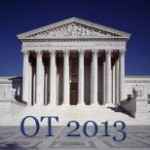US Supreme Court Review: Two Employee Benefit Cases (Dudenhoeffer and Hobby Lobby)
 (This is another post in our series, Looking Back at the U.S. Supreme Court’s 2013 Term.) This blog post is the third of three on labor and employment law cases by the United States Supreme Court in the last Term. This post focuses on two employee benefit law/ERISA cases: Fifth Third Bancorp v. Dudenhoeffer and Burwell v. Hobby Lobby Stores, Inc. First, a disclosure: Along with six other law professors, I co-wrote an Amicus Curiae brief in support of the Dudenhoeffer plaintiffs.
(This is another post in our series, Looking Back at the U.S. Supreme Court’s 2013 Term.) This blog post is the third of three on labor and employment law cases by the United States Supreme Court in the last Term. This post focuses on two employee benefit law/ERISA cases: Fifth Third Bancorp v. Dudenhoeffer and Burwell v. Hobby Lobby Stores, Inc. First, a disclosure: Along with six other law professors, I co-wrote an Amicus Curiae brief in support of the Dudenhoeffer plaintiffs.
Dudenhoeffer involves so-called ERISA stock-drop litigation, which has been rampant in the federal courts for a couple of decades now. The basic formula of these cases is that, as part of the employer-sponsored retirement plan (whether an employee stock ownership plan (ESOP) or a participant-directed 401(k) plan), the employer offers its own stock as either the entire pension plan investment or part of the pension plan investment. When the company goes south and its stock price falls, plan fiduciaries find themselves in a difficult position as far as whether to sell the stock or to hold on to it. This is especially so when the plan fiduciary has conflicting duties as an officer of the company and as a fiduciary of the plan. As a corporate officer, not only is the person supposed to act in the best interests of shareholders to maximize the value of the company, but securities law forbids them to trade stock based on non-public material information. As a fiduciary to the ESOP or 401(k) plan, ERISA gives that same person an obligation to act in the best interest and with the same care as a prudent fiduciary would when making decisions about that employee benefit plan. And in case you are wondering, ERISA Section 408(c)(3) gives employers the ability to assign the same person both officer and plan fiduciary roles or set up so-called “dual-role fiduciaries.”

 The majority opinion in the Supreme Court’s decision in the Hobby Lobby case is founded on the Religious Freedom Restoration Act (RFRA) and the restrictions it places on the Secretary of Health and Human Services (HHS) when she regulates and enforces the Affordable Care Act (ACA). While the issues raised by Justice Ruth Bader Ginsburg’s dissenting opinion as to the battle of interests protected by the Constitution are significant, an important practical legal issue that was not addressed in the Hobby Lobby case is the power of HHS to interpret the meaning of the ACA. Considering the majority’s reliance on two terms that go undefined by the Court — “sincere religious belief” and “closely held corporation” [see page 29 of the slip opinion and footnote 28] — and the fact that none of the other Hobby Lobby opinions address the meaning of these terms, it is essential that these terms be defined as they fit into the ACA context.
The majority opinion in the Supreme Court’s decision in the Hobby Lobby case is founded on the Religious Freedom Restoration Act (RFRA) and the restrictions it places on the Secretary of Health and Human Services (HHS) when she regulates and enforces the Affordable Care Act (ACA). While the issues raised by Justice Ruth Bader Ginsburg’s dissenting opinion as to the battle of interests protected by the Constitution are significant, an important practical legal issue that was not addressed in the Hobby Lobby case is the power of HHS to interpret the meaning of the ACA. Considering the majority’s reliance on two terms that go undefined by the Court — “sincere religious belief” and “closely held corporation” [see page 29 of the slip opinion and footnote 28] — and the fact that none of the other Hobby Lobby opinions address the meaning of these terms, it is essential that these terms be defined as they fit into the ACA context.